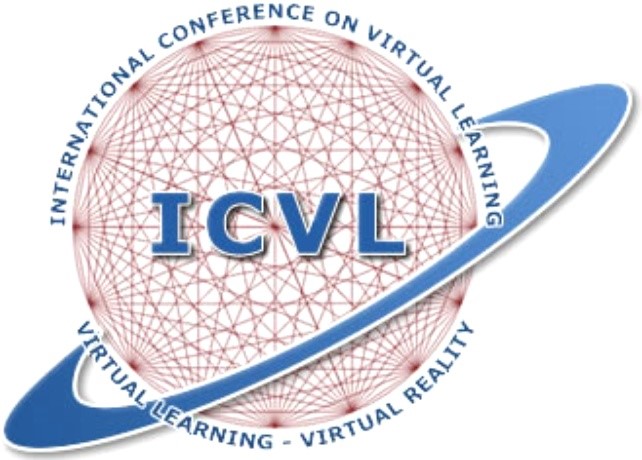Coming soon
Thursday, 10th April 2025 | 8:45 – 15:00
Online via Webex
Connection via Webex
Welcoming Remarks
CS I Dr. Carmen-Elena CÎRNU
ICVL President
Invited Talk: UPTAKERS - Upgrading Academic Skills and Innovative Capacities through Virtually Inclusive Hybrid Studios
Prof. Dr. Eng. Eden MAMUT, Dr. Eng. Laurentiu OANCEA
Panel 1
CHANGING EDUCATION BECAUSE OF TECHNOLOGY DISRUPTION
Moderator: Prof. Dr. Grigore ALBEANU
Using Artificial Intelligence in Universities
Adrian ADĂSCĂLIȚEI
Generative AI in Education: A Bibliometric Analysis
Huseyin BICEN
The Hallucination Problem in Generative Artificial Intelligence: Accuracy and Trust in Digital Learning
Bogdan-Iulian CIUBOTARU
Determination of Artificial Intelligence Usage Tendency in Primary Education
Cigdem HURSEN, Doğuş BEYOĞLU
Exploring the Integration of Metaverse Technologies in Engineering Education through the SAMR Model
Veselina NEDEVA, Snezhana DINEVA
An Ontology of Knowledge Components in the Domain of Artificial Intelligence
Ciprian NEGURĂ
Recurring Learning Activity Planning Model
Ion Alexandru POPESCU
Virtual education with 3D bread models
Angel NIKOLOV, Zlatin ZLATEV, Daniela Orozova, Nadezhda ANGELOVA
Artificial Intelligence to support STEM learning in the classroom
Vera SHOPOVA, Ivan DIMITROV
A security model with biometric components for e-Learning systems
Sorin SOVIANY, Cristina-Gabriela GHEORGHE, Maria GHEORGHE-MOISII
Panel 3
NON-TECHNOLOGICAL DIMENSION OF ONLINE LEARNING
Moderator: CS II Dr. Ionuț PETRE
Web-Based Student Academic Performance Predictor Based on Study Skills and Habits
Alan Karl S. GATDULA, Lanie B. LAUREANO, Rich Anjo M. CAPILOYAN, Apple Erika M. MEJOS
Perceptions of Medical Students on Artificial Intelligence during their Journey of Learning Turkish
Funda GEZER, Damla KARAGOZLU, Enis FASLI
Future Workforce and Corporate Accountability in AI-Enhanced Educational Activities: Addressing the Impact on Employment and Ethical Practice
Cristian Gabriel IANC, Laurențiu Gabriel DINCĂ, Alexandra GHINEA
Ethical Use of Digital Tools in Medicine - A Review on Key-Concepts and Challenges
Claudiu Gabriel IONESCU, Monica LICU
Bibliometric Analysis of Chatgpt Based on Scopus Data: Global Research Trends (2022–2024)
Kevin MEJÍA RIVERA, Mirna RIVERA GARCÍA, Luis REYES FLORES
Students' Perspectives on the Adoption and Use of AI Tutoring Systems in Higher Education Using UTAUT2
Narmin Mohammed NOORI, Hawkar XALID
Instructors' and students' perspectives on Moodle's effectiveness as a Learning Management System
Narmin Mohammed NOORI, Awaz Naaman SALEEM
Opportunities and satisfactions of higher education students towards online assessment
Fezile OZDAMLI, Melissa Rutendo MUTIZWA, Erinc ERCAG
Model for rapid assessment of engagement in academic courses using genetic algorithms
Ion Alexandru POPESCU, Nicolae BOLD
Research on the harmful impact of digital technology on effective learning in adults
Sorin TOPOR
Q & A
Panel 2
INSTRUCTIONAL DESIGN IN DIGITAL ERA
Moderator: Prof. Dr. Natalia BURLACU
The Clip Thinking Phenomenon: The Typology of Technological Products for the Bounds' Overstepping and Strengths' Leveraging in the Educational Needs
Natalia BURLACU
Social and Economic Predictors of Digital Skills. Benchmarks for Public Policies in a Time of 4.0 Revolution
Vicențiu-Robert GABOR, Ciprian IFTIMOAEI, Adrian-Victor VEVERA
Flipping the Grade: Empowering Students through Self-Assessment in Informatics
Maria GUTU
Determination of the Artificial Intelligence Readiness Levels of Pre-Service Teachers
Cigdem HURSEN, Kemal A. BATMAN
Advancing Education Management through Integrated CRM Solutions Leveraging the Scalability and Efficiency of a Distributed Web Systems Architecture
Marian ILEANA, Pavel PETROV, Vassil MILEV
Avatars and Artificial Intelligence in Education: A Bibliometric Analysis
Damla KARAGOZLU, Funda GEZER
Artificial Intelligence in Educational Assessment: A Bibliometric Review of Current Applications and Future Perspectives
Fezile OZDAMLI, Erinc ERCAG
Multidisciplinary Approach Based on the Application of Interdisciplinary Connections in Teaching Natural Sciences in Lower Secondary Education Stage
Gencho STOITSOV, Dimitar STOITSOV, Vera SHOPOVA, Ivan DIMITROV
A Comparative Analysis of Primary Digital Education Design and its Implementation
Tatiana VEVERIȚA, Andrei BRAICOV
Panel 4
INNOVATION AND BEST PRACTICES IN VIRTUAL EDUCATION
Moderator: Prof. Dr. Carmen HOLOTESCU
3D Printing in Education – A Way to Foster Learners’ Activity and Improve Their Creativity and Design Skills
Nadezhda ANGELOVA
Virtual Reality in Training: A Multidimensional Analysis of Technologies, Challenges and Paradigms
Razvan DUTESCU, Mihai APOSTOL, Ionut MOCANU, Monica BARBU
Exploring the Potential of E-Learning in Economic Crisis Prediction
Daniela GÎFU
Integrating Virtual Reality into Engineering Education: An Interactive Application for Learning Mechanisms
Petru-Iulian GRIGORE, Corneliu Octavian TURCU
Leveraging AI for the Promotion of Digital Culture among Young Generations: A Holistic Approach to Achieving SDG 11.4 on the Safeguarding of Cultural Heritage in the Digital Age
Cristian Gabriel IANC, Laurențiu Gabriel DINCĂ, Alexandra GHINEA
Digital Micro-Credentials in the Context of Educational Metasystemology: An Approach to Open Education Pedagogies with Video Lessons Designed Learning-Centered Strategies
Elena RAILEAN, Yuliana GERMAN
The Training on Business Process Reengineering and its Application in the Service Sector
Anita STOYANOVA, Emil DELINOV, Daniela OROZOVA
Implementing Robo-Advisory Systems In Virtual Universities For Smart Student Counselling
Mahan TAHVILDARI
Q & A
Closing Remarks
Ella Magdalena CIUPERCĂ
ICVL Vice-president
